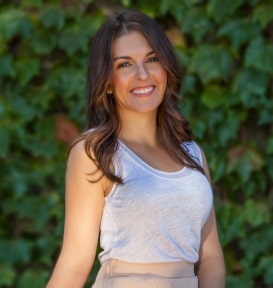
Erica Drewry, CEDRD, RDN, LD
Website: www.alignednutrition.com
Instagram: @alignednutrition
Facebook: @alignednutrition
How did you get started in your career?
I always liked science and I loved the idea of working with people. I started out majoring in pharmacy and quickly realized that I wanted to help people more preventatively. Once I began studying nutrition, I became obsessed with being thin and learning the “perfect” way to eat. I used nutrition information as a weapon to try and “whip myself into shape.” I wasn’t willing to go into practice for fear of infecting others with my rigid and unrealistic standards.
Fortunately, I was able to work with a dietitian and therapist which transformed how I view nutritional science. I couldn’t believe how much psychology was involved in changing my eating habits and self-management.
From there, I had a clinical job and some earlier entrepreneurial stints. Gaining clinical experience was invaluable to me and exposed me to eating disorders right away. I entered private practice in 2011 and haven’t looked back. Over the years, I’ve honed my niche to end up where I am today.
What is your typical day?
Many people think they want to go into private practice while being unsure what that actually looks like. Do you work typical 9-5 hours? Do you take naps at 2 pm on a Thursday? The answer is whatever you want it to be. Consider what kind of boss you are to yourself.
It’s important to develop systems and have a job description for yourself just like you would at a traditional job. It’s a good idea to batch your tasks and have set office hours. I resisted this structure for years (that’s why I left the hospital job – freedom!). But the truth is, you can easily work too much or completely ineffectively if you don’t develop systems and refine your tasks. You are the intake coordinator, dietitian, marketer, biller, collection agency, networker, CEO, etc. Which leads me to delegation – it’s helpful to hire professionals into your business as you grow. If you are in sessions for 6 hours and someone new reaches out to you for help, it might be nice to have someone answer/return their phone call?
In a typical day, I consider structuring my schedule, the roles I’m performing that day, developing systems for things I do more than once, and now hiring out tasks I don’t enjoy or do as well as someone else.
What advice do you have for future nutrition professionals?
When I first started, I had no idea what supervision was. It is essentially hiring a more seasoned RD to advise you, support you, and help you learn how you show up in practice. Beyond helping you with a tough case, a good supervisor can share how to manage the emotional labor of this work and deal with your own feelings about who or what work you are doing. I recommend this to everyone whether it’s required or not. Supervision helped me not feel alone and supercharged my professional expertise and philosophy.
Learning about yourself and how to take care of yourself is essential. This goes beyond getting your nails done or taking a weekend away but being able to check in with yourself on a regular basis and meet your needs. Those needs might be rest, time away from work, making a difficult phone call, a tough decision in business, creating a policy with yourself, focusing on a specific type of client, or seeking support from a therapist.
